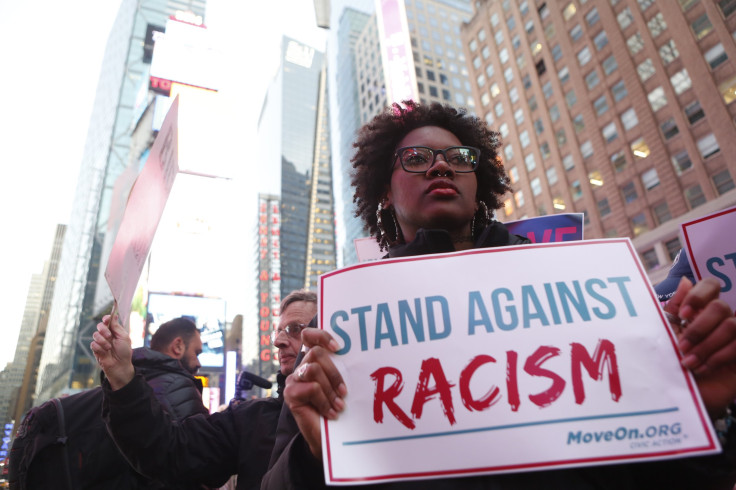'Donald Trump's Bigotry' vs Hillary Clinton: Black Voters And Presidential Candidates Have A Shaky History

U.S. presidential candidates have traditionally courted minority voters, but the 2016 presidential election has left some sensing doubt as to the sincerity of those efforts by Republican nominee Donald Trump and his Democratic counterpart Hillary Clinton. While the former secretary of state's campaign has made its own series of missteps with minorities, perhaps no other White House hopeful in modern history has highlighted the racial, political divide than the New York billionaire.
The lingering issue for Trump was brought the forefront again this past weekend after a tweet from his verified Twitter account seemed to equate the recent Chicago shooting death of an NBA star's relative with why all black people should vote for him. It was a move that raised the racial antennae of many, including Charles Blow, who penned a New York Times op-ed Monday morning — titled "Donald Trump's Bigotry." Blow argued that his stance shouldn't be a surprise to anyone anymore because, as he wrote, "it's true!"
But Clinton has had her own fair share of apparent racial faux pas, a fact that could lead some to wonder if the 2016 presidential candidates have the shakiest history with ethnic minorities in the history of presidential nominees.
Examples of Trump appearing to be racially insensitive have been well documented for nearly the past two years, but accusations of racial discrimination against the real estate mogul date back decades, according to a New York Times report Sunday detailing the many times black people were denied housing in his properties. In addition, former Ku Klux Klan Grand Wizard David Duke is an avid Trump supporter and it has been reported that Trump's candidacy has bolstered other white nationalist groups.
There have also been reports of supporters at Trump rallies getting violent with and spewing racisla epithets at black protesters in attendance, as documented in a recent New York Times video.
Clinton, too, has a record of alleged racial insensitivity, including a fact that dogged her current campaign early on when black protesters would routinely interrupt her events to voice their opposition to her candidacy based on past comments that referred to black males as "super predators." She apologized for "those words" early this year, two decades after first uttering them.
Earlier this summer Trump announced on live TV that he thought the Black Lives Matter movement advocated killing law enforcement, a proclamation that further stoked the racial flames his candidacy has ignited with not just black people but also a handful of other ethnic minorities.
EXACTLY...
— TemiaBrinson.com (@TemiaBrinson) August 20, 2016
Trump asks African Americans: "What do you have to lose?" Vote Trump! pic.twitter.com/6lwxmWsy01
Clinton also stumbled when it comes to Black Lives Matter, especially last summer when she told a historically black church in Mississippi that "all lives matter," which was greeted as a sign of disrespect to the growing movement for social justice spurred on by instances of police brutality against black people.
While each Clinton and Trump have clear differences in campaigning, they have at least one thing in common that is likely offensive to many black people: both are alleged to have contributed to the "birther" movement that expresses doubt about President Barack Obama's U.S. citizenship and where geographically he was born.
CNN documented at least four different instances where Clinton seemed to at least be partially involved in adding to the apparent conspiracy about Obama's birthplace and religion, including one in 2007 — during her inaugural presidential campaign — when one of her adviser's circulated a memo about Obama's "lack of American roots."
Likewise, Trump said in 2011 that he dispatched private investigators to Hawaii, where Obama was born.
Despite the above, Clinton is predicted to lopsidedly enjoy the support of African-American on Election Day, with about 90 percent of black people in a recent poll offering support to the former secretary of state. Conversely, even in the face of his apparent support among black pastors, as of last week Trump was polling at 8 percent among black people.
In the most recent Real Clear Politics general election poll, Clinton was leading Trump nationally by an average of 6 percentage points.
© Copyright IBTimes 2024. All rights reserved.






















